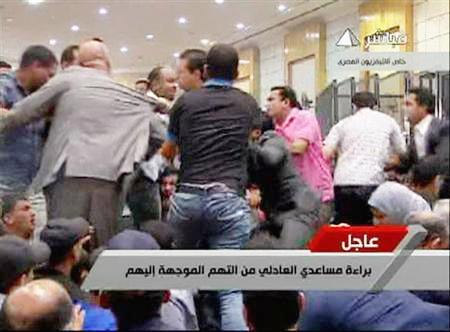CAIRO (Reuters) – Hosni Mubarak, toppled by an uprising last year after 30 years ruling Egypt, was sentenced to life imprisonment yesterday for his role in killing protesters after a trial that sets a precedent for holding Middle East autocrats to account.
But it was not enough for thousands of Egyptians who poured onto the streets afterwards in a nation already on edge before a deciding presidential vote in two weeks. Some wanted Mubarak executed, others feared the judge’s ruling exposed weaknesses in the case that could let the ex-military strongman off on appeal.
Wearing dark glasses, the 84-year-old Mubarak was wheeled into a courtroom cage on a hospital stretcher to join co-defendants including his two sons Alaa and Gamal, former Interior Minister Habib al-Adli and six security officials.
Addressing the hushed courtroom, Judge Ahmed Refaat said: “The court has ordered a punishment for Hosni Mubarak of life in prison based on charges of participating in crimes of killing and attempted killing.”
Propped up on the stretcher and stony-faced during the verdict, the only words the former air force commander uttered were to acknowledge to the judge over a microphone that he was present before the ruling was read out. Afterwards, he was whisked off by helicopter to a prison hospital.
His two sons, businessman Alaa, and Gamal, a former banker was once seen as being groomed for president before his father was toppled on Feb. 11, 2011, had corruption charges quashed, but stay in jail over another case referred to court last week.
Refaat sentenced Adli, whose police force was hated for the brutal tactics used against the revolt, to life in prison. About 850 people were killed in the 18-day uprising against Mubarak.
But the judge acquitted the senior security officials for lack of evidence, a decision that worried lawyers for victims’ families who said that could help Mubarak win any appeal.
Businessman and Mubarak ally Hussein Salem, being tried in absentia, was also acquitted of corruption charges.
It was the first time an ousted Arab leader had faced an ordinary court in person since a wave of uprisings shook the Arab world last year, sweeping away four entrenched rulers.
State television said Mubarak suffered a “health crisis” when he was flown to Cairo’s Tora prison, where he was admitted to a hospital facility. Mubarak had been held at a luxurious military-run hospital during the 10-month trial.
A medical source said Mubarak argued with those around him when he landed at Tora, refusing to leave the aircraft. Mubarak always appeared in court sessions on a stretcher but his ailment has not been defined.
Long feted by Arab leaders and his US and other Western allies as a lynchpin politician who offered stability in a turbulent region, Mubarak’s ousting has helped redraw the Middle East’s political map and let Islamists he once repressed sweep up parliamentary seats in the Arab world’s most populous state.
The Muslim Brotherhood, Egypt’s biggest Islamist group, is now fielding one of the two challengers in a fraught run-off vote for the presidency against Mubarak’s last prime minister, Ahmed Shafiq, who like his former boss once led the air force.
Unlike elections in Mubarak’s time, that were routinely rigged and the outcome guaranteed, no one can be sure who will emerge victor in the June 16 and 17 run-off that has polarised the nation, leaving many worrying both about Islamist rule and the alternative of handing power back to a former military man.






